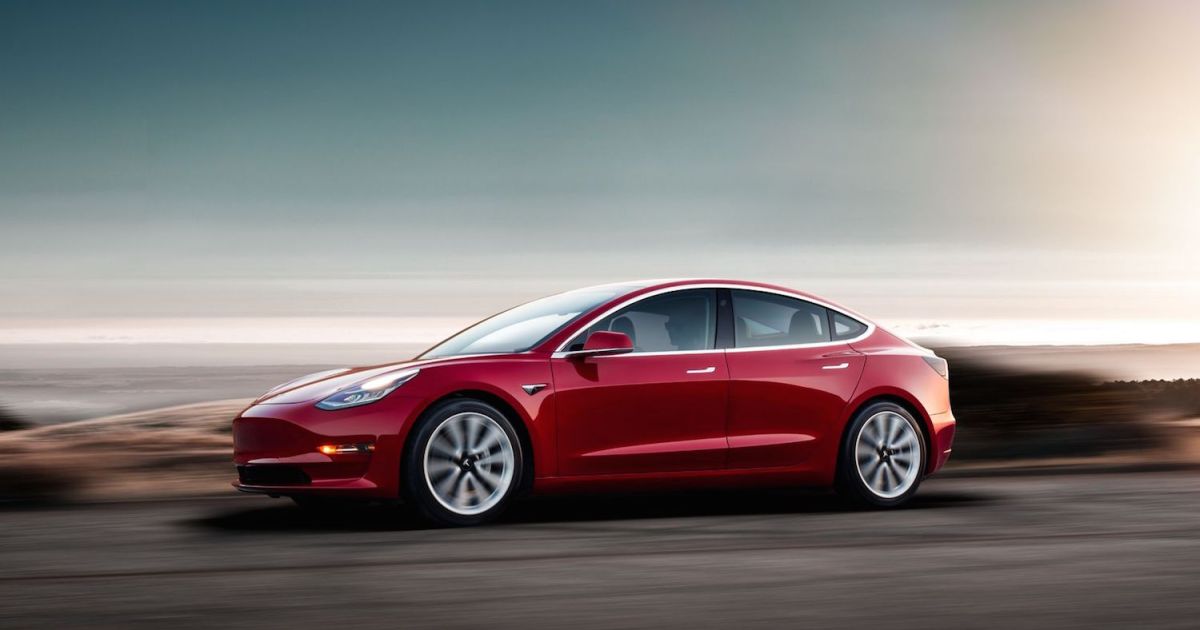Kicking your gasoline addiction is easier than ever in 2023, because electric cars are becoming increasingly common. They’re not cheap, dinky golf carts, either. Whether you’re looking for a high-performance sedan, a luxury car, or a humble crossover, there’s a good chance you can find an electric car that suits your lifestyle. The Tesla Model 3 is the best electric car available because its technology is outstanding, it’s stylish, and it’s somewhat affordable, but there are other great options.
At a glance
| Product | Category | Rating |
| Tesla Model 3 | Best electric car overall | 5 out of 5 |
| Rivian R1S | Best electric SUV | Not yet rated |
| Chevrolet Bolt | Best affordable electric car | 3 out of 5 |
| BMW iX | Best luxury electric car | Not yet rated |
| Lucid Air | Best performance electric car | 4 out of 5 |
| Ford Mustang Mach-E | Best electric crossover | Not yet rated |
The best: Tesla Model 3
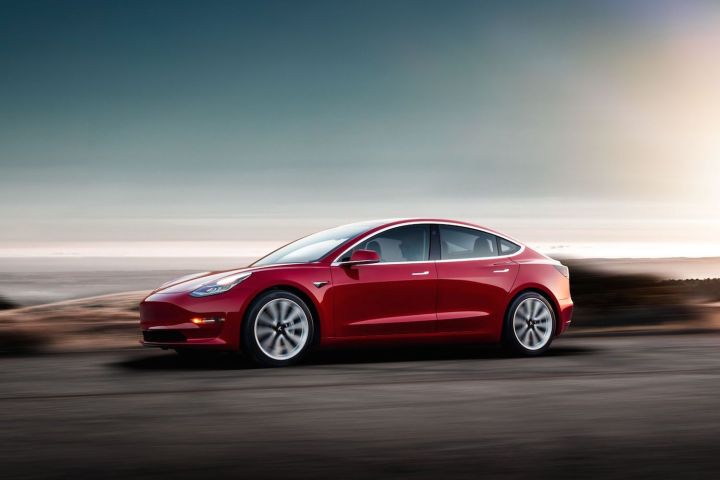
Why should you buy this? It is simply the best electric vehicle on sale.
Who’s it for? Those who simply want the best EV package, complete with excellent charging support and a good software experience.
How much will it cost?$40,240
Why we picked the Tesla Model 3:
Modestly stylish on the outside, comfortable on the inside, surprisingly fun to drive, and available with up to 333 miles of range, the Tesla Model 3 checks all the right boxes. But that’s just the beginning. Where the Model 3 truly impresses is its innovative convenience and safety features (including some of the industry’s best semiautonomous driving aids) and future-proofed technology. Thanks to Tesla’s over-the-air updates, the Model 3 is always improving and can be reconfigured according to your needs and wants — even after you buy the car.
Tesla may be experiencing the growing pains most mainstream automakers have long overcome, and the Model 3 certainly hasn’t been immune from quality-related problems, but the tech startup has much to teach the automotive industry about how to build a compelling electric car, complete with a charging experience that doesn’t make you want to pull your hair out.
Read our Tesla Model 3 review
The best electric SUV: Rivian R1S

Why should you buy this? It’s well-built, roomy, and full of great features.
Who’s it for? Anyone that wants a little more room from their electric car.
How much will it cost? $78,000
Why we picked the Rivian R1S:
If you need a little more room from your electric car, then the Rivian R1s is the way to go. Rivian has become a well-known name in the world of electric cars and for good reason — its cars are well-built, offer a ton of features, and are perfect for large families or those who simply like extra storage. The R1S isn’t cheap, starting at $78,000, but when you factor in the quality and compare it with other electric SUVs, it’s actually not terrible.
Of course, if you do spring for the R1S, you’ll be getting tons of extra features. Inside the car, there’s enough room for seven seats, plus it offers a well-designed interior and well-built exterior.
The R1s is no slouch compared to other EVs. It delivers between 260 and 352 miles of range, depending on the model you go fit, and it can get you from zero to 60 miles per hour in as little as three seconds, which makes it very quick. Speed and size, all in one package — perfect for the family that wants to get from A to B as quickly as possible.
Read our first-drive Rivian R1S review
The best affordable electric car: Chevrolet Bolt EV
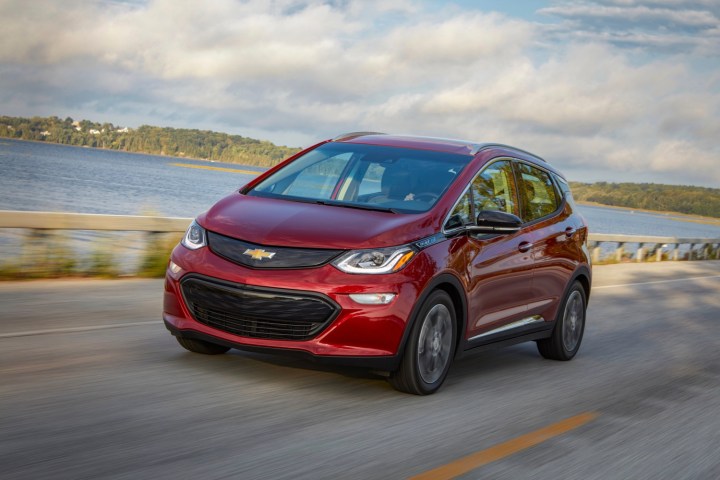
Why should you buy this? It’s one of the affordable electric cars that’s worthy of a road trip.
Who’s it for? Drivers who want to give up gas without sacrificing range.
How much will it cost? $26,500
Why we picked the Chevrolet Bolt EV:
For years, motorists in the market for an electric car had to choose between a long range or an affordable price. Relatively affordable EVs like the original Nissan Leaf could be procured for under $30,000, but they needed recharging after about 80 miles, which is inconvenient at best. On the other end of the spectrum, luxury EVs like the Lucid Air could top 300 miles between charges, but their price tags made them an unrealistic option for most.
But a few years ago, we finally got an electric car for the masses: the Chevrolet Bolt EV. Boasting a range of up to 259 miles and priced under $30,000, the relatively small Bolt helped reshape the world of EVs by making them accessible to more people. Practicality and affordability are just two elements of a good car, but thankfully, the Bolt has much more up its sleeve. While we prefer the more expensive Model 3, the Bolt EV is a fantastic alternative — though it is getting axed from Chevrolet’s lineup at the end of 2023.
With a total output of 200 hp, the Bolt EV is quite zippy. Factor in the low center of gravity afforded by the floor-mounted battery pack, and you have a planted, stable, and surprisingly responsive people carrier that never needs to visit the gas station. Add in a spacious and comfy cabin, a standard 10.2-inch touchscreen, and DC fast charging options, and you have an industry game-changer you’ll actually want to drive. It’s available in all 50 states, and there’s no waiting time to get one.
Read our Chevrolet Bolt review
The best luxury electric car: BMW iX

Why should you buy this? It’s absurdly plush.
Who’s it for? People who won’t settle for just any electric car.
How much will it cost? $88,095
Why we picked the BMW iX:
BMW has a history of building highly luxurious cars, and the iX embodies that. Sure, you may not love the exterior, but step inside and you’ll discover what luxury can be. We’re talking seat massagers, heaters, and coolers in both the front and the back seats, stunningly luxurious materials throughout, and more.
The experience of being a passenger in the iX is perhaps better than being a driver. In the back, passengers get their own in-armrest controls for their seats, along with automatic window shades. Even better? There’s a huge TV screen that can be lowered from the ceiling of the car, and passengers can either use the built-in Fire TV operating system or connect their own devices. It’s pretty impressive.
Of course, it’s a whole lot of fun to drive too. The iX is responsive and quick, and delivers up to 324 miles of range, which makes it great for longer-distance driving too.
Read our first-drive BMW iX review
The best electric performance car: Lucid Air
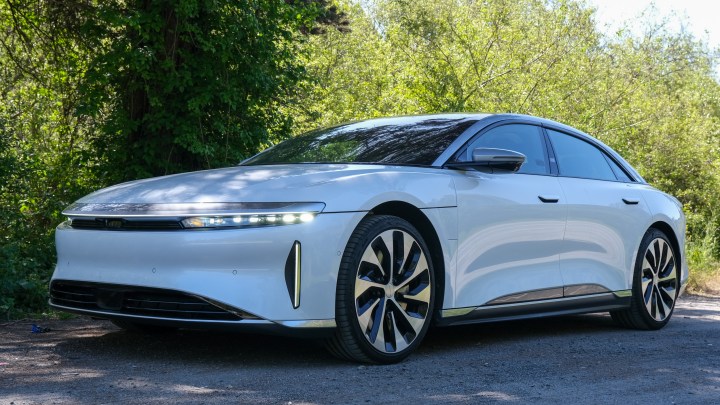
Why should you buy this? It’s extremely fast, has an unparalleled range, and is incredibly comfortable.
Who’s it for? Adrenaline junkies, executives, and those with debilitating range anxiety.
How much will it cost? $89,050
Why we picked the Lucid Air:
If we were to judge based on capability alone, the Lucid Air would unquestionably be our pick for the best electric vehicle. We live in the real world though, and with a starting price over $90,000, the fact remains that most people simply can’t afford to drive a new Lucid Air.
However, if you can swing the price, and you’re looking for something fast, comfy, and emissions-free, the range long-range Lucid Air is right up your alley. Even the base model, called the Pure, has a range much longer than any other electric car out there, at 410 miles. Upgrade, and you’ll get up to 520 miles with the Lucid Air Dream Edition R.
Range is just one part of the equation, though, because Lucid also boasts a super quick-acceleration, luxurious features like the multiscreen setup at the front and more.
The best electric crossover: Ford Mustang Mach-E
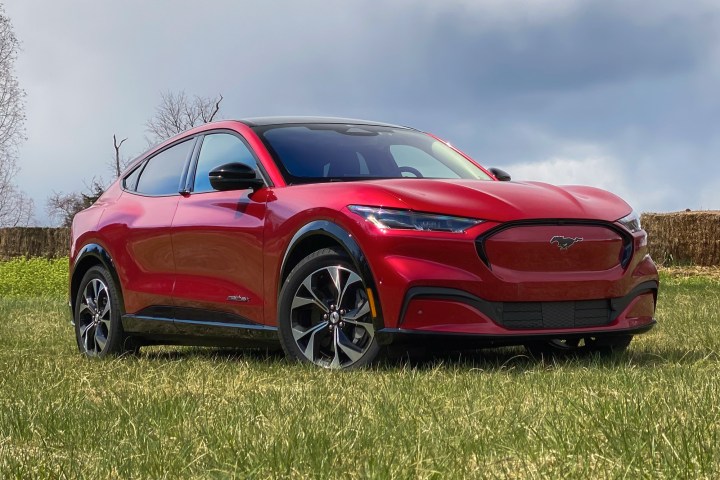
Why should you buy this? It’s fast and sporty like a Mustang should be.
Who’s it for? Anyone who wants a roomy car that has a reasonable price.
How much will it cost? $42,995
Why we picked the Ford Mustang Mach-E:
The Mach-E has been out for a few years now, and it has well and truly proven itself as one of the better electric cars out there. It may not look like a traditional Mustang, but hit the accelerator, and you’ll see why it deserves the pony on the grille.
The Mach-E makes a compelling case for itself as an electric car too. The car gets up to 312 miles of range and can charge relatively quickly. It only has five seats, but it’s relatively spacious inside, and there’s plenty of room for most situations.
The Mach-E looks pretty sporty and sleek, and it comes in a range of different colors. A wide array of options means there should be a model for everyone.
Read our full Mustang Mach-E review
How we test
The Digital Trends automotive team tests vehicles through a comprehensive scrutinizing process. We examine the qualities of the exterior and interior and judge them based on our expertise and experience in the context of the vehicle’s category and price range. Entertainment technology is thoroughly tested as well as most safety features that can be tested in controlled environments.
Test drivers spend extensive time behind the wheel of the vehicles, conducting real-world testing, driving them on highways and back roads, as well as off-road and race tracks when applicable. When we weren’t able to get behind the wheel ourselves, we leaned on our experiences with each automaker and compared vehicles on a statistical basis, using metrics like cost, range, performance, and available features to make our decision.
Common electric vehicle terms you may not know
- AC: Short for alternating current. This type of electric current reverses direction at regular intervals and is very efficient. Most modern electric cars, such as Teslas, use AC.
- DC: Short for direct current. This type of electric current stays constant in its direction. DC electric motors are generally simpler and cheaper than AC electric motors, but they are less efficient.
- EV: Short for electric vehicle.
- Fast charge: Fast chargers utilize a higher current than a standard domestic outlet. For example, a Tesla Supercharger can charge a 90kWh Model S to 80% in 40 minutes. In a standard outlet, the same process would take a few hours.
- kWh: Short for kilowatt-hour, a unit of electricity usage.
- Lead Acid Battery: An older style of battery that uses lead and sulfuric acid to transfer and store energy. They are much cheaper than Lithium-Ion batteries but have a shorter service life.
- Lithium-Ion Battery: Often shortened to Li-Ion, batteries of this type are common on modern electric cars and use a compound called lithium-cobalt oxide to transfer and store energy.
- MPGe: Short for miles per gallon (of gasoline) equivalent. To calculate MPGe numbers, the U.S. Environmental Protection Agency (EPA) calculated that there are approximately 115,000 BTUs of energy in one gallon of gasoline, and used that formula to convey the amount of power an electric car uses in terms most drivers are familiar with.
- Nickel-Metal Hydride Battery: Often shortened to NiMH, batteries of this type are found on some older electric cars, however, most automakers prefer Lithium-Ion.
- Regenerative braking: A system that uses energy created by braking to recharge the battery.
Editors’ Recommendations

